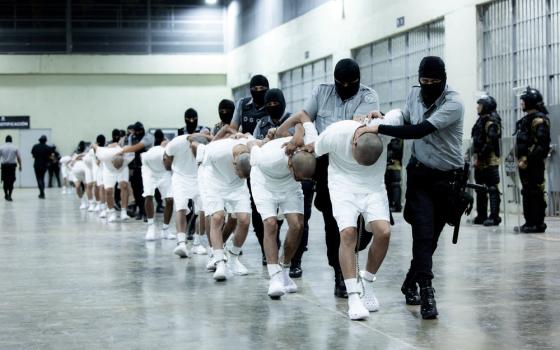
A file photo shows the sun setting behind one of the guard towers at the Federal Correctional Complex in Terre Haute, Indiana. The death chamber at the correctional facility is where the federal death penalty is carried out. (OSV News/Reuters/Andy Clark)
Catholic Mobilizing Network (or CMN), a prominent Catholic advocacy group opposing capital punishment, has issued a renewed call for President Joe Biden to take decisive action towards abolishing the federal death penalty. With 40 inmates currently on federal death row, the organization is urging Biden to use his remaining time in office to commute these sentences. Biden promised in his 2020 campaign to end capital punishment at the federal level.
For Catholic Mobilizing Network, Biden's administration marked a historic shift, as he became the first U.S. president to openly oppose the death penalty. During his term, federal executions were paused, a decision that CMN supported as an important step toward justice reform. Yet with 40 men still on federal death row, the organization told NCR it is keenly aware of how swiftly federal death penalty policies could change under the new Trump leadership.
NCR reached out for comments several times to the White House and the Department of Justice, asking if Biden was considering commuting the 40 death sentences, but did not receive any response as of Nov. 26.
Trump's first term record on capital punishment is a cause for concern among anti-death penalty advocates. During his previous administration, Trump reinstated federal executions, overseeing a surge of 13 executions in just six months during the COVID-19 pandemic.
"This resurgence of government-sanctioned violence at the federal level was horrifying," said Catholic Mobilizing Network's executive director Krisanne Vaillancourt Murphy, adding that Trump may once again prioritize executions and even seek to expand the use of the death penalty as hinted in his electoral campaign.

Krisanne Vaillancourt Murphy, executive director of Catholic Mobilizing Network, a Washington-based group that advocates for the abolition of capital punishment in line with Catholic teaching, is pictured in an undated photo. Catholic Mobilizing Network is among advocacy groups pushing President Joe Biden to commute existing federal death sentences during his final months in office. (OSV News/Courtesy of Catholic Mobilizing Network)
When in August the Democratic Party omitted any mention of the death penalty from its 2024 platform for the first time in 20 years, it drew criticism from advocates who viewed it as a retreat from previous commitments to abolish capital punishment for good.
Vaillancourt Murphy told NCR she found the Democratic Party's action "incredibly disappointing," particularly after President Biden's earlier promises and his imposition of a federal execution moratorium.
"Trump has a sordid history with executions," she said in the wake of the elections. "Now is not the time to step back from death penalty abolition."
Advertisement
"The upcoming Jubilee Year of 2025 is a moment of profound renewal and forgiveness, a time to heal wounds and show compassion. By taking this action, you would offer a powerful testimony of your dedication to life and justice, leaving a legacy rooted in mercy," she said. "It is fitting that [Biden] should act on his faith and do what is squarely within his constitutional authority to do."
The Catholic Church's opposition to the death penalty is deeply rooted in its teachings on the sanctity of life. Pope Francis, in his 2020 encyclical Fratelli Tutti, described the death penalty as "inadmissible," reaffirming his revision of the Catechism of the Catholic Church in 2018, which declared capital punishment an attack on human dignity and called for its abolition worldwide.
Regardless of the outcome of Catholic Mobilizing Network's appeal to Biden, Vaillancourt Murphy affirmed the organization's commitment to the cause and stressed that their work will continue "no matter who is in the White House," emphasizing that the fight against the death penalty is both a spiritual and humanitarian mission.
Catholic Mobilizing Network is not the only organization campaigning against the death penalty in the U.S. that has called for immediate action after the election results. On Nov. 14, a newly released report titled "Fool's Gold: How the Federal Death Penalty Has Perpetuated Racially Discriminatory Practices Throughout History," published by the Death Penalty Information Center, once again a drew a connection between the racial violence of lynchings and the ongoing disparities in federal death sentences.
According to the center, "the federal death penalty has been used disproportionately against people of color," continuing a pattern of racial targeting, specifically against Black and Native Americans. Additionally, "statistical analyses confirm persistent racial disparities in federal death penalty prosecutions." Since 1989, 73% of federally authorized death penalty cases have involved defendants of color. In certain jurisdictions, such as the Eastern District of Virginia and the Eastern District of Missouri, every person sentenced to federal death row has been a person of color.
According to the report, these racial disparities extend to how cases are prosecuted. The center cited a study which concluded that federal death penalty trials are more than twice as likely to result in death sentences when the victim is a white woman. To the center, this echoed historical patterns where accusations of harm against white women often leads to extrajudicial violence against Black men. Of those executed during Trump's first presidential term, seven out of the 13 were Black or Native American.
"This in-depth study should prompt policymakers to carefully consider the federal death penalty's history and its ongoing injustices before making decisions about its future," said Robin M. Maher, executive director of the Death Penalty Information Center.






